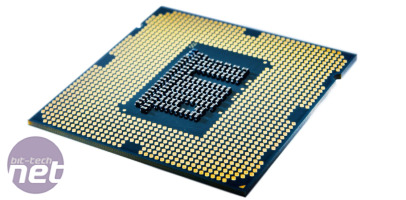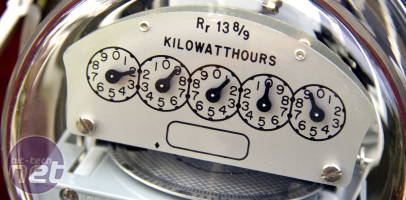
It's easy to forget that Intel and AMD have low-power versions of most of their current line-up of CPUs. For most of us there's little reason to consider them, with them only registering on our radar when it comes to thinking about all-in-ones, media PCs or net tops. There's a good reason for this too. While they have lower power consumption, these CPUs are very often clocked slower than their full-fat counterparts but cost noticeably more. [break]
Take for example the Core i3-3220T. It currently retails for £95, has a clock speed of 2.8GHz and a TDP of 35W. By comparison, the Core i3-3240, which has a TDP of 55W is clocked 600MHz faster at 3.4GHz but costs just £88.
Okay, that's a relatively small price premium, but considering you're losing a fair chunk of performance, is it worth paying?
The answer if you're an always-on, large data center or server farm is of course yes - it's well known that in these scenarios upgrading for the sake of a small power saving on each component can save enough money in the long run that you easily recoup your costs. But what about a home environment? I decided to do a few rough calculations...
Assuming a kilowatt-hour price of 15p, a 65W TDP CPU - a Sandy Bridge Core i3 2120 for example, uses around 1p an hour in electricity at full load, or around 24p a day. In comparison a 55W Ivy Bridge Core i3 CPU uses around 20p per day and a 35W TDP CPU will use 12.8p per day. Spread out over a year you're looking at £87.60, £73.00 and £46.72 respectively. Clearly these differences easily cover the extra initial outlay.
However, unless you're running a serious server at home, 100 percent load is very unlikely. Instead for an always-on HTPC or NAS PC, it's likely to be at full load no more than, say, a quarter of the time. With that taken into account we're looking at £21.90, £18.25 and £11.68 total power cost for the same three CPUs. The gap has closed significantly but you're still looking at recouping your costs within about a year.
What you probably don't need me to spell out to you at this point, though, is that for your main office/gaming/family PC, you're probably not looking at it being worth your while getting a low power chip, even for a basic family PC. If we say a family PC will on average be on for 8 hours a day, of which 2 hours will be gaming or doing some other intensive task at 100 percent load, we come out with figures of £12.78, £10.64 and £6.81. Considering the performance hit of opting for the low power model, we'd certainly not be inclined to splash the extra cash up front.
But, power saving is of course only one aspect of a low TDP chip. The other consideration is heat, and it's here that low power models make their strongest argument. By requiring less hefty coolers, they can be squeezed into much smaller cases, and even passively cooled cases.
Take for example recent fanless cases we've reviewed such as Akasa's Euler and Streacom's ST-FC5S EVO WS. A 65W CPU here proved precisely why the Euler is only rated for 35W TDP CPUs, with it becoming roasting hot during testing with the more powerful chip. The point is that opting for a low-power CPU could make things much more comfortable if heat and also noise are of more concern than performance.
You could also consider under-clocking your CPU - reducing the voltage and frequency to reduce power draw. This is also something I've toyed with, although the main obstacle here is that many low-end motherboards either don't allow you to tweak the CPU voltage at all, or only allow you to do so in an upwards direction. If your motherboard does allow this then it's well worth spending some time to find the best ratio between performance and power draw.
So what can we conclude? Well, ultimately, as with highly efficient PSUs, if you pay the premium for a power efficient CPU, it could pay for itself over its lifetime, but only if that PC is going to get serious amounts of usage and not be upgraded for a good couple of years. If you're just after a modest CPU for a family or office PC, though, it may be worth saving on the initial outlay and perhaps buying a more efficient PSU instead.
Unless, of course, you're talking about it being a space-saving or silent PC too. While you could underclock a cheap CPU, it's a risky bet as to whether the motherboard will allow it, and it's likely you may not be able to reduce power by enough to fit within the thermal limitations of your desired case/cooler anyway.
Have you considered a low-power CPU? Let us know in the forum.
Take for example the Core i3-3220T. It currently retails for £95, has a clock speed of 2.8GHz and a TDP of 35W. By comparison, the Core i3-3240, which has a TDP of 55W is clocked 600MHz faster at 3.4GHz but costs just £88.
Okay, that's a relatively small price premium, but considering you're losing a fair chunk of performance, is it worth paying?
The answer if you're an always-on, large data center or server farm is of course yes - it's well known that in these scenarios upgrading for the sake of a small power saving on each component can save enough money in the long run that you easily recoup your costs. But what about a home environment? I decided to do a few rough calculations...
Standard TDP CPUs are cheaper, but does it pay in the long run to buy a low power model? - Click to enlarge
Assuming a kilowatt-hour price of 15p, a 65W TDP CPU - a Sandy Bridge Core i3 2120 for example, uses around 1p an hour in electricity at full load, or around 24p a day. In comparison a 55W Ivy Bridge Core i3 CPU uses around 20p per day and a 35W TDP CPU will use 12.8p per day. Spread out over a year you're looking at £87.60, £73.00 and £46.72 respectively. Clearly these differences easily cover the extra initial outlay.
However, unless you're running a serious server at home, 100 percent load is very unlikely. Instead for an always-on HTPC or NAS PC, it's likely to be at full load no more than, say, a quarter of the time. With that taken into account we're looking at £21.90, £18.25 and £11.68 total power cost for the same three CPUs. The gap has closed significantly but you're still looking at recouping your costs within about a year.
What you probably don't need me to spell out to you at this point, though, is that for your main office/gaming/family PC, you're probably not looking at it being worth your while getting a low power chip, even for a basic family PC. If we say a family PC will on average be on for 8 hours a day, of which 2 hours will be gaming or doing some other intensive task at 100 percent load, we come out with figures of £12.78, £10.64 and £6.81. Considering the performance hit of opting for the low power model, we'd certainly not be inclined to splash the extra cash up front.
But, power saving is of course only one aspect of a low TDP chip. The other consideration is heat, and it's here that low power models make their strongest argument. By requiring less hefty coolers, they can be squeezed into much smaller cases, and even passively cooled cases.
Take for example recent fanless cases we've reviewed such as Akasa's Euler and Streacom's ST-FC5S EVO WS. A 65W CPU here proved precisely why the Euler is only rated for 35W TDP CPUs, with it becoming roasting hot during testing with the more powerful chip. The point is that opting for a low-power CPU could make things much more comfortable if heat and also noise are of more concern than performance.
You could actually recoup the extra outlay of a low-power CPU in less than two years - Click to enlarge
You could also consider under-clocking your CPU - reducing the voltage and frequency to reduce power draw. This is also something I've toyed with, although the main obstacle here is that many low-end motherboards either don't allow you to tweak the CPU voltage at all, or only allow you to do so in an upwards direction. If your motherboard does allow this then it's well worth spending some time to find the best ratio between performance and power draw.
So what can we conclude? Well, ultimately, as with highly efficient PSUs, if you pay the premium for a power efficient CPU, it could pay for itself over its lifetime, but only if that PC is going to get serious amounts of usage and not be upgraded for a good couple of years. If you're just after a modest CPU for a family or office PC, though, it may be worth saving on the initial outlay and perhaps buying a more efficient PSU instead.
Unless, of course, you're talking about it being a space-saving or silent PC too. While you could underclock a cheap CPU, it's a risky bet as to whether the motherboard will allow it, and it's likely you may not be able to reduce power by enough to fit within the thermal limitations of your desired case/cooler anyway.
Have you considered a low-power CPU? Let us know in the forum.

MSI MPG Velox 100R Chassis Review
October 14 2021 | 15:04







Want to comment? Please log in.